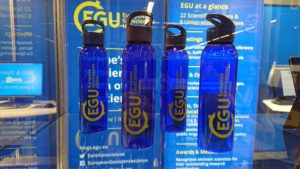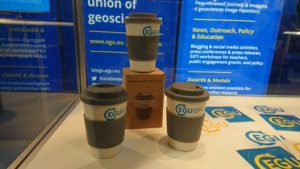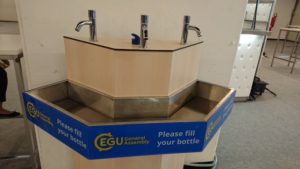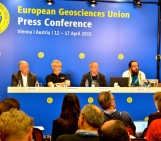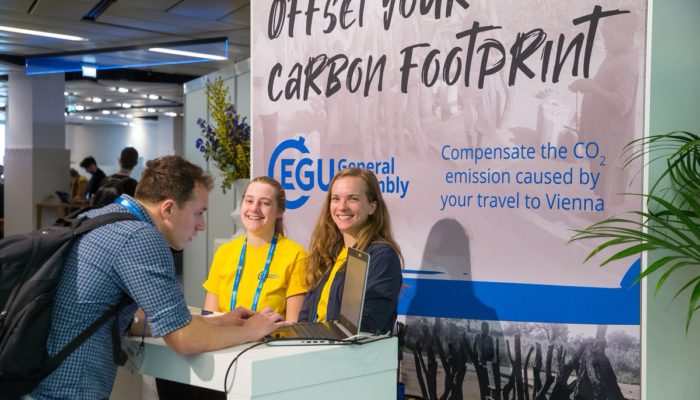
Each spring thousands of geoscientists from more than 100 countries make their way to Vienna for the EGU General Assembly. Major conferences like this offer researchers many opportunities to advance their careers: from gaining research inspiration and learning new skills to sharing ideas and networking with peers. But participant travel to and within Vienna, plus their accommodation, food and drinks and the operation of the conference centre, have a substantial carbon footprint.
The EGU programme committee and council regularly discuss ways to reduce this footprint, and in the past few years have implemented a host of green measures. Below we’ve compiled a few of the ways the EGU has worked to make your conference experience more environmentally friendly—as well as some ways that every Union member can help.
Travelling responsibly

EGU encourages attendees to take the train whenever possible. Current overnight options include service from Rome, Zurich, Brussels, and many cities in Germany!
Many of the more than 16,000 General Assembly participants travel by plane. Because flying is a major source of greenhouse gas emissions, the EGU strongly encourages participants to travel to the conference by train whenever possible. For the past few years our Swiss colleagues have even collaborated with the Swiss Federal Railways (SBB) for discounted rides for General Assembly attendees (which will be available again for EGU 2020), and we are working on providing similar arrangements with other European railway companies.
Since 2018, EGU has also given attendees the chance to offset the carbon emissions they emit when travelling to and from Vienna. In this initiative’s first year, 4,800 attendees (32% of all conference registrants) opted into this carbon offsetting scheme. For 2020, the EGU council has decided to go even further by offsetting the travel emissions of every conference participant. “To the best of my knowledge, this will be a first for any major geoscience event,” said EGU Programme Committee chair Susanne Buiter in a recent EGU news release.
Our green travel initiatives don’t stop once you arrive in Vienna, however. The registration fee for the meeting includes a local transportation ticket (valid from Monday-Friday during the Assembly), and for 2020 we will provide a guarded bicycle parking lot at the convention centre.
Reduce, reuse, recycle
Another environmental impact is the waste and single-use materials generated for major science conferences. For example, while coffee and tea are the lifeblood of any major meeting, sustaining the caffeine levels of our conference attendees uses up thousands of single-use products. That’s why we encourage attendees to bring their own coffee mugs and, since 2019, have offered reusable coffee cups for sale during the meeting. If every participant brought or purchased their own coffee cups for our meeting, we could save up to 100,000 paper cups each year.
Since 2017, water fountains have been available throughout the convention center, and we have begun asking attendees to bring their own reusable water containers as well. To further cut down on plastic use, we have replaced most plastic cups with returnable glass bottles at the evening Networking Breaks. This initiative will be extended to the opening, closing, and conveners’ receptions in 2020.
We also have been working on ways to minimise using new materials for conference signage, informational packets, badges, and other materials. For example, we no longer print the programme booklet or our daily conference newsletter, EGU Today; instead, this information is only available digitally. By moving to digital platforms, we save 1 million printed A5 pages and 15,000 double-sided A4 printed pages each year.
Coming together for sustainability
Making the General Assembly more environmentally friendly cannot be achieved by the EGU alone, and we have collaborated with our meeting organiser, Copernicus, and venue, the Austria Center Vienna, to enact numerous greening measures. These include replacing 7,000 bulbs with LEDs (saving more than 500,000 kilowatt hours each year), installing solar collectors to provide hot water to all restrooms and kitchens, and modernising the facility’s ventilation system.
We also need help from the EGU community to meet our sustainability goals. From taking a train to EGU instead of flying and bringing a reusable mug, small actions add up to make significant change when multiplied by 16,000 attendees. If you plan to do your part in making the General Assembly more environmentally friendly, let us know by taking the #GreenEGU pledge on twitter. And if you have any ideas for how we can further improve our greening initiatives, you can comment below or give the programme committee your feedback.

